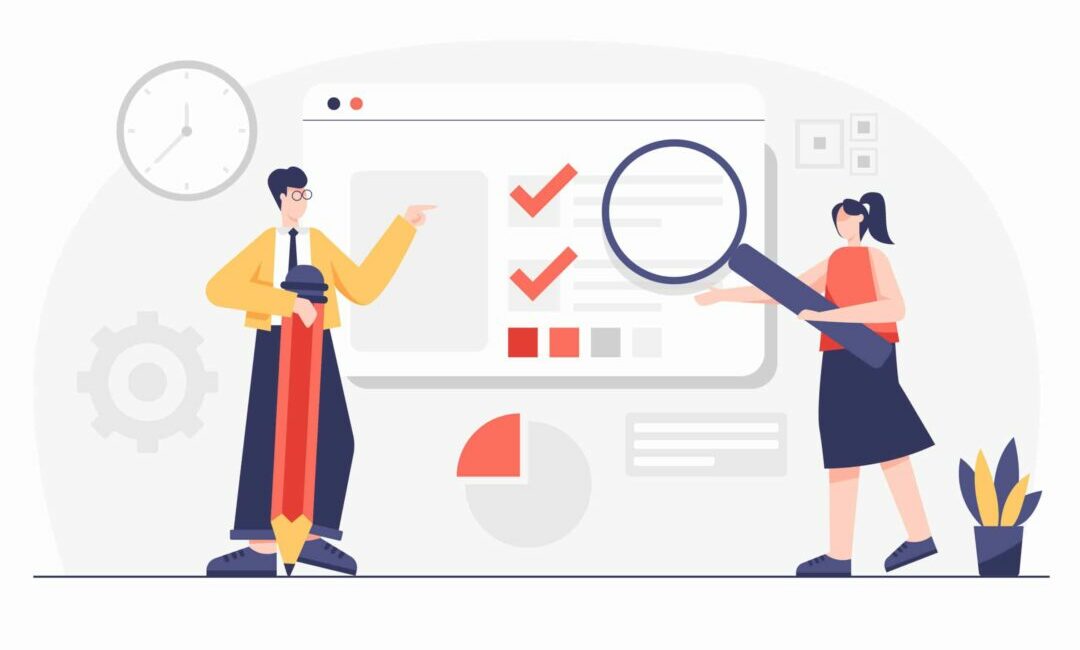The definitive checklist for an effective SEO web audit
In SEO it is easy to make mistakes and reversing their consequences takes time. That is why the SEO web audit is so important, since it allows you to make an accurate diagnosis and detect problems before it is too late.
Whether it is a large or small company, new or established, a website audit is key to not leaving any loose ends and taking actions that improve your organic positioning and thus reach more potential customers.
In other words: If you want your business to reach its full potential, keep reading. Here we will explain what an SEO web audit is, why it is essential, how to know if you need one and, of course, what aspects it should include.
What is an SEO web audit?
Just as a doctor requests a blood test to check the general state of health of his patient, a web page audit allows us to know the situation of the site that you want to position.
An SEO web audit consists of analyzing a website and evaluating those aspects that affect its organic positioning. This is the first step of any SEO positioning strategy.
Why it is important to do a website audit
For several reasons. In the first place, it serves to obtain a diagnosis of the current situation, the starting point from which to start working.
It also allows to know the strengths and weaknesses of a site, and those aspects that can be improved in the short, medium and long term. In other words, the SEO strategy is designed based on the audit result.
However, the advantages of doing an SEO web audit go beyond organic positioning, since it also allows you to evaluate the user experience.
Because? Because to establish its ranking, Google evaluates different parameters and the most decisive ones are related to the experience that a user lives when entering a page. These are the famous Google Core Web Vitals, which in Spanish are known as “essential web metrics” or “main web metrics”.
What are Google Core Web Vitals
They are metrics incorporated by Google in mid-2021, which are especially focused on the user. They are based on your real experience, that is, the data comes from real user experiences (more precisely from a report called CrUX, which collects anonymous metrics from real users who visit a certain URL).
There are three Google Core Web Vitals:
- LCP (largest contentful paint): The amount of time it takes to render the largest content element visible on the first scroll, from when the user requests the URL. This is important because it indicates to the user that the URL is indeed being loaded. Google rates an LCP of 2.5 seconds or less as “Good.”
- FID (first input delay): It is the time that elapses from when a user first interacts with a page (clicks) until the browser responds to that interaction. This is important on pages where the user needs to do something, because that’s when the page has become interactive. According to Google, the FID should be under 100 milliseconds.
- CLS (Cumulative Layout Shift): It is a score that should be as close to 0 as possible. The CLS evaluates the visual stability of a page and penalizes unexpected changes in the design of the layout. From 0 to 0.1 means a good user experience.
How to know if my site needs an SEO audit
CAny new project needs an SEO audit and it is better to do it before being published. It is also advisable to do an audit before migrating an existing project (to avoid repeating mistakes).
Another reason that warrants an audit is when Google makes updates to its algorithm.
In conclusion, the SEO web audit should be done periodically, especially if a drop in organic traffic is detected.
Web page audit: The definitive checklist
There is no single recipe for doing an SEO web audit. The aspects to be evaluated will depend on the knowledge and experience of the person who executes it.
In any case, the parameters that an audit analyzes can be grouped into three categories: technical SEO, SEO On-Page and SEO Off-Page:
- Technical SEO: They are actions that directly affect the way a site is crawled and indexed by search engines.
- SEO On-Page: It refers to the optimization of a site to help a search engine understand what it is about and classify it accordingly.
- SEO Off-Page: It has to do with strategies aimed at linking the website with other sites and promoting the business.
Let’s see what actions of each category cannot be missing in any SEO web audit.
Technical SEO
Site map
To index websites, Google first crawls through them with algorithms called “spiders.” Although these robots are quite intelligent, it is always a good idea to help them.
As? Offering them a site map or sitemap (an XML file that contains the structure of all the pages that make up the web) and a archivo robots.txt, in which we explain to Google which pages we want to index and which not.
Load speed
As a user you know how infuriating it can be to enter a website and have it take too long to load. If that happens, it is most likely that, tired of waiting, you will go elsewhere. For this reason, as we already saw in the section on Core Web Vitals, download time is a vital aspect for Google.
Mobile experience
In addition, it must be taken into account that most users use mobile devices to navigate. Therefore, offering a site that does not look good on mobile devices is pointless.
In fact, since mid-2019, Google has used a method called “mobile-centric indexing”. Since then, any new site that Google has not indexed, is analyzed according to its mobile version.
SEO On-Page
Indexability
It is one of the most important points: Knowing if Google is crawling and indexing your website. Google offers a tool called Google Search Console, which allows you to know if the site is being correctly indexed and which pages in particular.
Another option is to enter the Google search engine and write “site:elnombredetusitio.com”, which will result in all the indexed pages of your site (or at least several of them).
Content quality
Content is a touchy subject, as it needs to be read by both people and Google. In other words, it is important to make sure that the content is interesting for users and can be interpreted by search engines. As? Offering useful information, correctly structured and well written, without forgetting the use of keywords.
Investigation of keywords
Do keyword research (keyword research) means finding out what terms your target audience uses and what the competition is for each of them.
Often the keywords with the most searches are also the ones with the most competition. Therefore, it is not necessarily a good idea to go for them, especially if your site does not have the authority to compete.
Tags HTML
On the one hand, we must take into account the semantic HTML tags, which indicate to browsers what role each of the elements of a web page plays (navigation bar, article, footer, etc.)
But also, when displaying a web page among its results, Google reads its meta tags, which include a title, description, keywords, etc.
Linkbuilding interno
Linking the various pages of a website through links helps in several ways.
First of all, it establishes the hierarchy between the different pages and helps the spiders to traverse it. But it also reduces the bounce rate, since it makes it more likely that a user who entered the page will continue browsing within the same site, instead of going to another site.
SEO Off-Page
It is about making a website authoritative, credible and trustworthy. Google tends to rank higher for sites with higher authority, but how does the search engine know that?
Mainly, through backlinks, that is, links from other websites that point to that site. When Google sees that many sites cite or point to a certain page, it considers that landing page to be a reference within the industry.
An SEO web audit should analyze this issue and, no matter how worrisome the diagnosis may be, do not despair. Backlinks are a craftsmanship, which takes a long time.
For this reason, many SEO agencies fall into the temptation of trying to trick Google, inventing and forcing these backlinks. ANDThese types of practices are known asblack hat SEO and they are not recommended, since Google penalizes them harshly.
How to review my website
The cheapest way to do it is to do it yourself. Today all the documentation is available on the web and there are free or paid courses.
Of course, you can also hire an SEO agency to do it for you and thus have the help of professionals on the subject. In fact, several agencies offer a free web SEO audit.
We at Chili do this as it seems like the best way to introduce you to our team of professionals and their work ethic.
With our free web audit, you will access a detailed report, which includes everything you need to know about the current situation of your site and what are the points that require improvement.


Join the discussion - 0 Comment